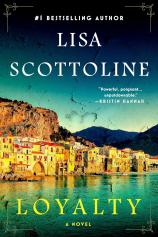CHAPTER ONE
PALERMO, SICILY
1810
It was the final night of the Festival of Saint Rosalia, and hundreds of people lined Via Toledo, cheering, praying, and singing hymns. Priests led the procession, holding tapers that glowed like halos in the darkness. Spectators looked up the street, craning their necks to see the ornate silver reliquary of the patron saint. The carabinieri faced that way, too, their plumed hats in a line, their horses shifting on polished hooves.
Only a bearded man looked away, down the street. Nobody noticed him in the shadows behind the crowd. He kept his eye on the wealthy families privileged to stand on the Quattro Canti, or Four Corners, which was the intersection of Palermo’s two most important streets: Via Toledo, extending to the harbor, and Via Maqueda, bisecting the capital.
The procession moved down the street, and the crowd’s fervor intensified, anticipating the reliquary. People kissed pictures of the young saint, held roses up to her, and cheered Viva Palermo e viva Santa Rosalia! Among the privileged on the Quattro Canti, the husbands surged forward to see better and the wives remained behind with the children.
The bearded man threaded his way to a little boy standing with his mother at the back of the Quattro Canti. He snuck up behind the boy and waited for the moment to pounce.
The saint’s reliquary popped into view, and the crowd erupted in shouting, cheering, and weeping. The boy’s mother burst into pious tears, and the bearded man made his move. He pulled a marionette from under his cloak and showed it to the boy. The boy reached for the marionette, and in one cruel motion, the man grabbed the boy and flung his cloak over him. The clamor of the crowd devoured the boy’s startled cry. The marionette dropped to the cobblestones.
The man ran away with the boy. The mother looked around for her son. She called him but didn’t see him anywhere. She whirled around, beginning to panic, then screamed. It was as if he had been swallowed by the crowd. She would remember this moment for all of her days.
The man jumped onto a bay mare and rode off with the boy. He galloped from the city proper and raced past prickly pear cacti, cypresses, and olive trees on a road illuminated by a crescent moon.
In time, he approached a dilapidated building set off by itself, a boxy, broken shadow in the night. It was the Ospizio di Santa Teresa, a mad house that held lunatics, lepers, and the poor.
The man entered the building’s courtyard and halted the mare. He dismounted and threw the crying child over his shoulder, then banged on the door, which was opened by a guard. The kidnapper handed the boy over with a sack of ducats, then left.
The guard pocketed the ducats and took the boy inside the madhouse. The place was dark at this hour, though it was never quiet. The wails, rants, and cries of a hundred lunatics echoed throughout its stone walls. The guard crossed the entrance hall with the boy and entered the kitchen, where the only illumination came from the moon filtered through a dirty window.
“Sit, boy!” The guard dumped the boy onto the wooden table.
“Mamma?” the boy whispered, teary. “Where’s Mamma?”
“She doesn’t want you anymore.” The guard picked up a knife, its sharp blade glinting in the moonlight.
“No!” The boy scrambled backward, terrified the guard would stab him. Instead, the guard used the knife to cut his own finger, drawing blood.
“Look what you did, boy! You cut me!”
“I didn’t! Mamma! Papa!”
“Shut up!”
The guard picked up the boy, left the kitchen, and crossed the entrance hall. He reached the stairs and descended into a gloom that reeked of mice and chamber pots. He lumbered down a hallway lined with the cells of the male lunatics. The walls were of crumbling plaster, and the metal doors dented from within.
“Renzo? Renzo?” one of the lunatics shouted.
“Renzo, I’m hungry!” shouted another.
“Let me out! Please, I beg you!”
The guard reached the end of the hall and stopped at an open door, scattering the rats. He entered a cell that contained only a chamber pot and the frame of a bed with no mattress. A crucifix hung on the wall above an iron chain that ended in a leg manacle. A small window, set oddly high, admitted moonlight through its bars.
The guard tossed the boy onto the floor and picked up the manacle, realizing it was sized for an adult, not a child. He would have to come back with a rope.
“Mamma!” the boy called out, sobbing.
The guard whacked him across the face, knocking him unconscious.
“Mamma!” the lunatics shouted. “Mamma!”



